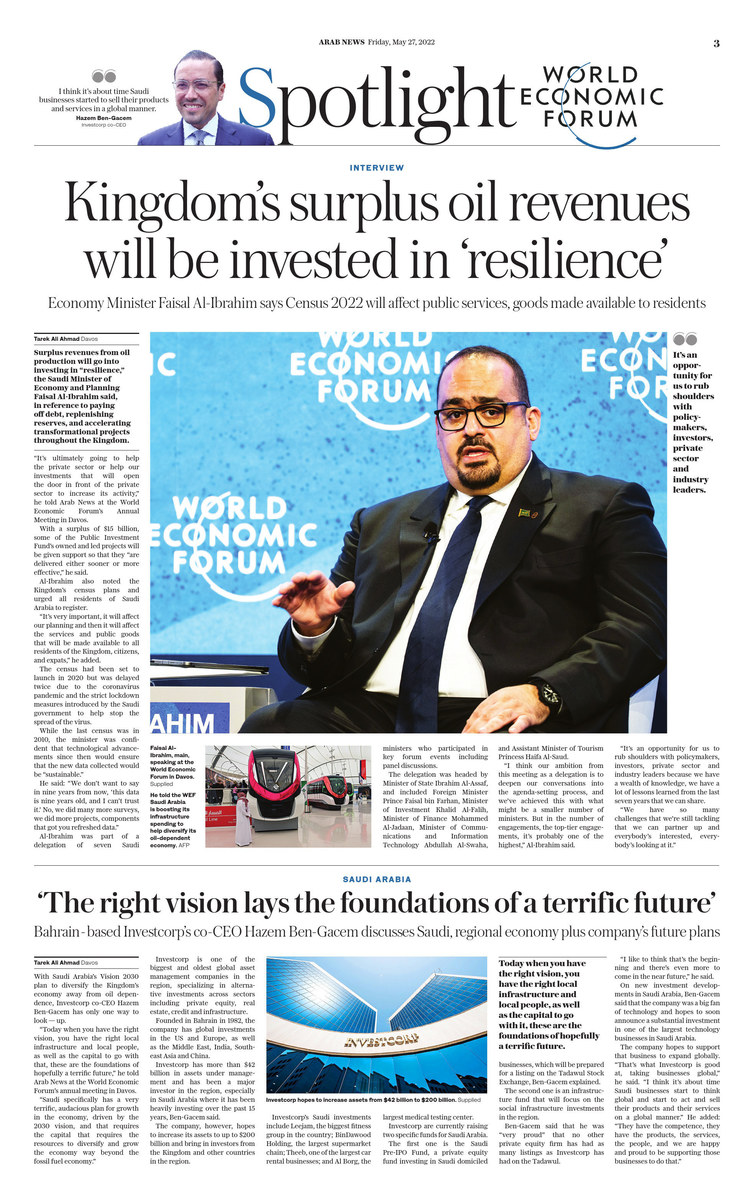DAVOS: Surplus revenues from oil production will go into investing in “resilience,” the Saudi Minister of Economy and Planning Faisal Al-Ibrahim has said, referring to paying off debt, replenishing reserves, and accelerating transformational projects throughout the Kingdom.
“It’s ultimately going to help the private sector or help our investments that will open the door in front of the private sector to increase its activity,” he told Arab News at the World Economic Forum’s Annual Meeting in Davos.
With a surplus of $15 billion, some of the Public Investment Fund’s owned and led projects will be given support so that they “are delivered either sooner or more effective,” he said.
Al-Ibrahim also noted the Kingdom’s census plans and urged all residents of Saudi Arabia to register.
“It’s very important, it will affect our planning and then it will affect the services and public goods that will be made available to all residents of the Kingdom, citizens, and expats,” he added.
The census had been set to launch in 2020 but was delayed twice due to the coronavirus pandemic and the strict lockdown measures introduced by the Saudi government to help stop the spread of the virus.
While the last census was in 2010, the minister was confident that technological advancements since then would ensure that the new data collected would be “sustainable.”
He said: “We don’t want to say in nine years from now, ‘this data is nine years old, and I can’t trust it.’ No, we did many more surveys, we did more projects, components that got you refreshed data.”
Al-Ibrahim was part of a delegation of seven Saudi ministers who participated in key forum events including panel discussions.
The delegation was headed by Minister of State Ibrahim Al-Assaf, and included Foreign Minister Prince Faisal bin Farhan, Minister of Investment Khalid Al-Falih, Minister of Finance Mohammed Al-Jadaan, Minister of Communications and Information Technology Abdullah Al-Swaha, and Assistant Minister of Tourism Princess Haifa Al-Saud.
“I think our ambition from this meeting as a delegation is to deepen our conversations into the agenda-setting process, and we’ve achieved this with what might be a smaller number of ministers. But in the number of engagements, the top-tier engagements, it’s probably one of the highest.
“It’s an opportunity for us to rub shoulders with policymakers, investors, private sector and industry leaders because we have a wealth of knowledge, we have a lot of lessons learned from the last seven years that we can share.
Al-Ibrahim added: “But also, we have so many challenges that we’re still tackling that we can partner up and everybody’s interested, everybody’s looking at it.”













